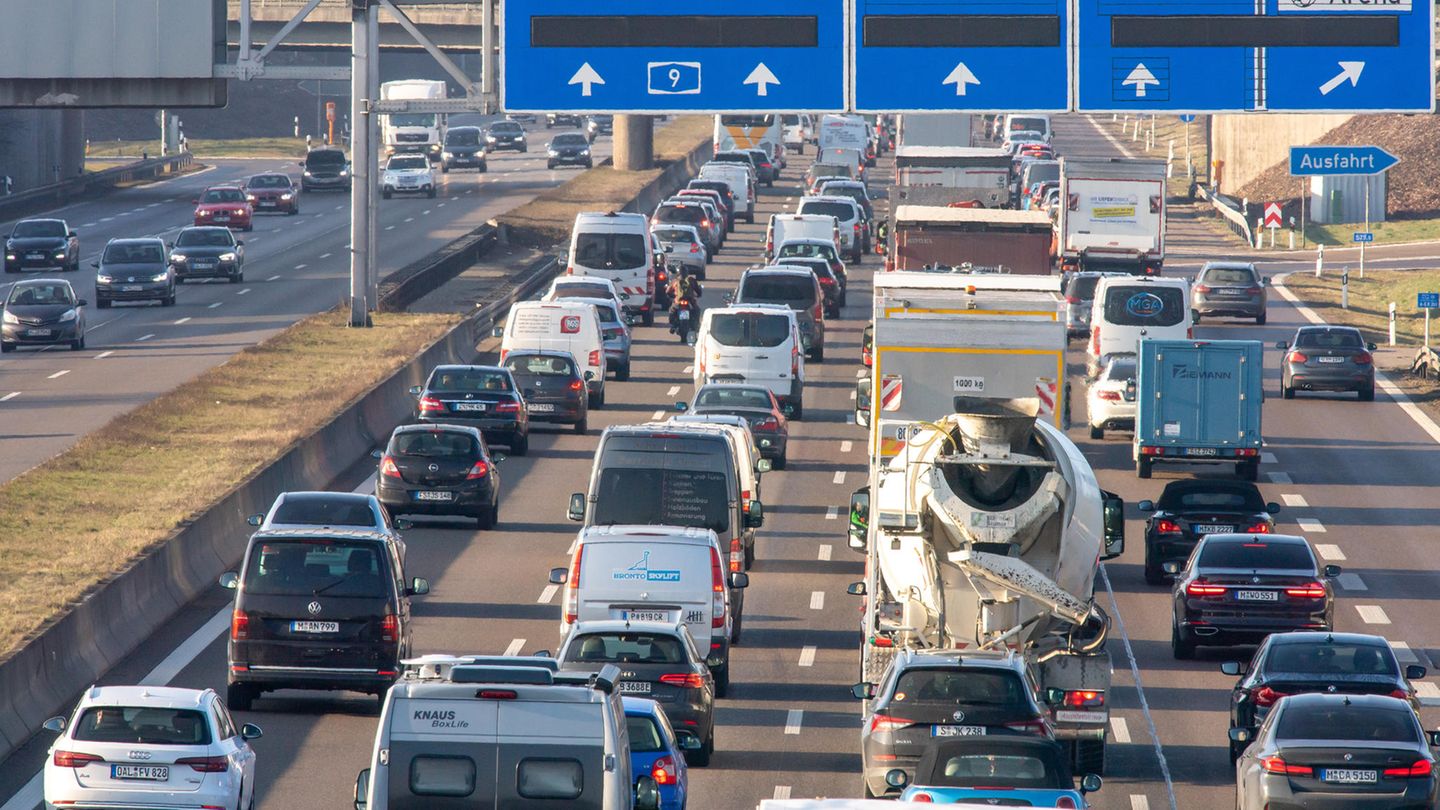The transport sector is the only area that has not reduced its greenhouse gas emissions since 1990: It now has to be adjusted massively, says the Federal Environment Agency. His proposals in the middle of the coalition negotiations are tough.
The Federal Environment Agency has spoken out in favor of drastic measures so that the climate targets in the transport sector can be achieved: higher fuel prices, abolition of the commuter allowance, massive expansion of buses and trains, speed limit, car toll. The CO2 price should therefore be at least doubled from 2022 compared to the previous plan. That would mean significantly rising petrol and diesel prices. In return, the Federal Office wants social compensation.
“When it comes to climate protection, traffic is heading in the wrong direction,” said the President of the Federal Environment Agency, Dirk Messner, of the German Press Agency. “Without massive efforts there, too, there will be nothing overall with climate protection.” Much more effective measures are needed in the transport sector.
Dirk Messner: We have to be honest
“Even if fuel prices are currently very high, the prices for gasoline and diesel do not tell the ecological truth,” said Messner. “From a climate and environmental protection point of view, it makes sense to further increase the CO2 price. And this is also possible in a socially acceptable way if the state uses the additional income from CO2 pricing to significantly reduce the EEG surcharge and at the same time use climate-friendly drive technologies to promote.”
Messner went on to say: “I am aware that the current fuel prices at petrol stations discourage many from having these discussions. But we have to be honest and discuss all options. Rising CO2 prices and repayments to citizens go hand in hand here . “
The transport sector is the only area in Germany that has not reduced its greenhouse gas emissions compared to 1990. “What is even worse: We will also clearly miss the targets we have set ourselves from the Climate Protection Act by 2030 in the transport sector if we do not make massive adjustments even 41 million over the legal targets. “
Abolish commuter flat-rate from 2027
This huge gap can be closed if a reform package of the Federal Environment Agency is implemented, said Messner. “We are strongly committed to the expansion of alternatives to car and truck traffic, to electrification and a polluter-pays, but also socially acceptable, CO2 pricing of transport.”
In a comprehensive paper, the authority proposes, for example, that the diesel privilege should be gradually abolished from 2023 – so far, diesel has been taxed less than petrol. In addition, the tax “subsidization” of company cars should be gradually phased out from 2022 onwards.
The commuter flat rate should be abolished from 2027, it continues. You set false incentives for climate protection. The flat rate supported the trend towards long commutes. At the same time, commutes to work would be more often covered in cars with only one occupant. In order to cushion social hardship, travel costs in hardship cases should be taken into account in income tax.
A car toll should also come
Messner said: “Of course we will again be accused of opening the usual” poison cabinet “. But it is the bitter truth that we have lost a lot of time in the transport sector and therefore now have to move many adjusting screws at the same time in order for the climate change to succeed.” The Federal Environment Agency had only recently presented a list of climate-damaging subsidies.
The authority also proposes to massively expand local public transport, bicycle and foot traffic and rail with additional billions of euros. There should be stricter, European CO2 fleet target values for new cars in order to accelerate the market launch of electric cars. The alternative is a national e-quota. The purchase of new low-CO2 and thus climate-friendly cars can be promoted through a bonus – and those with high CO2 emissions are made more expensive with a penalty.
The course would have to be set in the current decade so that Germany could become climate neutral by 2045, the paper says. This also requires instruments that will only take effect after 2030.
The Federal Environment Agency is proposing, for example, the introduction of a car toll on all roads from around 2030. “A mileage-dependent car toll creates incentives to shorten car journeys or to save them entirely or to switch to more climate-friendly means of transport instead,” it says in the paper. A car toll would make the largest contribution to road financing in the future. This is also necessary because the increasing electrification of transport leads to falling revenues from the energy tax. The introduction of a car toll in Germany was stopped by the European Court of Justice in 2019.
Messner also spoke out in favor of a general speed limit of 120 kilometers per hour on motorways. This could help the climate practically immediately and without additional costs and also increase traffic safety. The SPD, Greens and FDP have already rejected a general speed limit in their exploratory paper – the FDP is against a speed limit.
Source From: Stern
David William is a talented author who has made a name for himself in the world of writing. He is a professional author who writes on a wide range of topics, from general interest to opinion news. David is currently working as a writer at 24 hours worlds where he brings his unique perspective and in-depth research to his articles, making them both informative and engaging.




